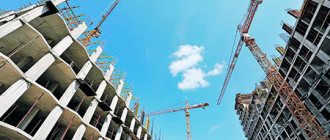Due to the accelerated development of the construction of new buildings and apartment buildings, housing disputes on civil issues are relevant. In many cases, we are talking about a violation of the integrity of common building communications, including heating pipes.
The result of an emergency situation may be causing property damage to the apartment owners and neighbors on the lower floor. If the battery bursts and the neighbors are flooded, who is to blame for the accident - the management company or the owner of the premises?
Who is responsible for the communication system
According to the terms of the agreement, the management company is responsible for all public communications. Communications include the heating and sewerage system, cold and hot water supply risers.
According to the provisions of housing legislation, the management organization is responsible only up to the 1st disconnect device, which is located on the riser branch of the communication system.
ATTENTION! If there is a pipe break in an apartment building up to the inlet valve, then the management company will be responsible for what happened.
The owner of the property is responsible for the condition of communications from the first locking device located in the apartment. Based on the information above, in order to determine who is to blame for a leaking riser, you must first determine the location of the breakthrough:
- If the battery ruptures and the integrity of the pipe after the shut-off valve is damaged, then the owner is responsible for the flood;
- if in an apartment building there is a leakage of the riser up to the valve, in this case the responsibility lies with the management company.
In some cases, the court places responsibility for the break in the branch of the common building riser after the 1st locking device on the management company. This usually happens when a heating pipe or radiator in a residential area breaks. This is due to the fact that a heating pipe cannot burst without a reason.
This can happen if the pressure in the pipes is too high or if accepted requirements for the operation of common property are not met.
The management organization must conduct routine inspections and repairs of the heating system in residential premises at least 2 times a year. After the inspection, the owner is issued a report with the results.
If the owners did not allow the specialist in, this is equivalent to improper use of utilities. Therefore, if an accident occurs, the fault lies with the owner of the living space.
Who to call if a pipe burst in an apartment, in a toilet, in an entrance, in a basement, on the street
There are not many options here:
- directly to the plumber - if you have his phone number;
- to the management company - HOA, housing office;
- to the emergency service of the city water canal - if the accident occurred on a weekend, at night, or a pipe burst on the street or in the basement.
But where the leak occurred will determine how the conversation will be framed. Either you report the accident and remind them that they (the management company) will have to pay for the damage, or ask them to send a plumber, who you will pay for the work.
If the breakout is very severe, then you can pay for the repairs out of your own pocket, and then demand reimbursement. You do this simply during a conversation, or in court.
What are the responsibilities of the owner
The Housing Code of the Russian Federation imposes obligations on the owner of the property to ensure that the engineering systems in the apartment are in proper condition . In particular, the owner is obliged to constantly monitor the heating pipes. If necessary, the apartment owner must urgently carry out repairs by contacting a qualified specialist.
If the pipes in a residential building are in poor condition, the owner must contact the local housing office and call a specialist to the house. The call must be formalized; to do this, you need to fill out an application at the Housing Office, which the organization’s employees will register and set a date for repairing the heating system.
After the work is completed, the owner receives an acceptance certificate, which he and the foreman sign. If you follow all the rules for calling a specialist and accepting the work performed, the management company will bear responsibility for poor-quality installation of the heating system.
At his own expense, the property owner must repair appliances that have failed due to his fault. Moreover, repairs of this equipment can only be carried out by a company specialist, for which the consent of the housing office is required. If the owner replaces the heating equipment himself, then if the neighbors on the lower floor are flooded, the responsibility will fall on him.
An owner who independently examines a specific case of flooding must take into account important nuances:
- Knowledge of the basics of legislation does not guarantee achievement of a positive result.
- Each specific case is individual.
- The possibility of a positive outcome of the event depends on many factors.
Accident during and outside the heating season
Who is to blame if a cold water riser leaks depends on the condition of the structural element and the actions of those responsible. If the pipe was worn out and the management company did not make repairs on time, it will hold the answer. If the replacement of the element was made by the owner of the apartment himself, the blame will fall on his shoulders.
A heating pipe burst, residents flooded their neighbors, then who is to blame? Despite the fact that during the warm season there is no circulation in the system, an accident can still occur. Heat supply companies are carrying out work to identify damaged areas. In order to avoid problems, houses are disconnected from the system during this period. However, the human factor cannot be ruled out, as a result of which a breakthrough may occur.
In the winter season, a plumbing accident at a heating plant will have more severe consequences. The temperature of the liquid in the system in the cold season exceeds +55 degrees Celsius. Such an accident will not only damage property, but can also lead to health problems and cause burns.
Flooding of neighbors when heating is turned on
Local flooding of residential premises in a multi-storey building can occur for various reasons. This happens if utility lines are outdated or due to breakdown of plumbing equipment.
A common cause of an accident is a battery rupture as a result of turning on the heating system, which is an important component of general building utilities in any residential premises. If a pipe bursts, not only the homeowners can suffer, but also the neighbors below. If you flood your neighbors on the lower floor when you turn on the heating in the apartment, do not panic.
First of all, it is necessary to determine the cause of the accident, as well as find who is to blame for this situation and from whom to demand compensation for the losses caused. If a heating pipe bursts inside an apartment, this does not mean that the owner is the culprit for flooding the neighbors. The management company may be held liable for the accident.
Finding out the causes of the accident
Most of the high-rise buildings were built during Soviet times. In those years, internal pipelines were steel or cast iron. Despite the strength of these materials, corrosion processes eventually lead to wear of the pipes, which requires their replacement. Many residents, trying to prevent an emergency, independently reinstall the elements of the system. However, this is the wrong step.
Who is responsible for the pipes in the apartment? The answer to this question is found in Art. 161 of the Housing Code, as well as in government decree No. 354 dated May 6, 2011. These acts note that the responsibility to monitor the condition of pipelines in multi-storey buildings is assigned to the management company. The same organization must carry out repair work.
Therefore, it is important to determine the cause of the plumbing accident. First of all, when a riser in an apartment bursts, you should find out who is to blame. This determines who will have the responsibility to compensate for the damage caused.
In what cases is the owner to blame?
It is not always possible to obtain compensation for damage from the organization servicing an apartment building. The court may rule in favor of the defendant. This can happen if the owner unauthorizedly made reconstruction of the living space. The homeowner can move the battery, change the number of sections, replace the heating device with or make an incorrect connection to the common heating riser.
The project of an apartment building provides for a specific heating system, indicates the type of battery and the materials used. When renovating an apartment, owners often change heating devices, installing radiators of a different configuration. For example, today bimetallic radiators made of steel and aluminum are popular.
This compact heating device looks more aesthetically pleasing than a cast iron radiator. Unfortunately, owners usually do not know that replacing a heating device requires an individual project agreed upon with all authorities.
When choosing a new radiator, you need to compare the technical characteristics of a modern heating device and the equipment installed when the house was put into operation. After replacing and moving the battery or when increasing the heating area, it is necessary to carry out start-up tests and draw up a report.
ATTENTION! If you decide to replace the internal heating system, you must familiarize yourself with the Rules for the technical operation of thermal power plants and SP 60.13330.2012 “Heating, ventilation and air conditioning.”
The owner is responsible if he independently replaced the components of the heating system. If the apartment is privatized, it is the property of the property owner, so he will be to blame for the bursting of a pipe in the premises. According to the provisions of the law, the owner of the residential area is obliged to maintain all utilities in good condition.
Battery failure due to the fault of third parties
If the heating system in a residential area breaks due to any actions of third parties, in most cases the property owner will be to blame, who is legally obligated to prevent such situations from occurring. However, if he can collect the evidence necessary for the ship's bailiffs that the battery burst due to the fault of third parties, he may be relieved of responsibility.
Alternatively, an emergency situation may occur if there is a manufacturing defect in the heating system or battery. There are cases when the riser in an apartment leaks due to the fact that the radiator was installed by an inexperienced plumber.
If the heating device fails, do not immediately throw away the damaged elements. They will be useful as evidence in case of poor-quality repairs.
A construction inspection can reveal who is to blame for violating the integrity of the battery, as well as refute or prove the presence of a manufacturing defect.
Who should pay if there are tenants living?
In recent years, apartments have often been rented out, but tenants do not always treat their rented housing as responsibly as its owners. By law, tenants are also required to keep the heating system in working order. Tenants will be held liable if it is proven that they intentionally caused damage to the property.
In this case, the tenants of the living space must compensate in full for the damage caused to the neighbors and the property owner. However, not everything is as simple as it seems at first glance.
According to the rules of the civil legislation of the Russian Federation under residential rental agreements, the landlord is obliged to ensure the provision of utilities to the tenant and to promptly carry out repairs of devices that are located in the residential premises and are intended to provide various utility services.
Based on the above, in order to find out who is to blame for the battery breakdown, it is necessary to determine under what exact circumstances the neighbors were flooded and what contributed to the emergency situation. Let's look at examples:
- If the mixer fails as a result of the expiration of the equipment's service life, then the fault lies with the lessor.
- If the heating system breaks down due to improper operation of the equipment, the tenant will be held responsible.
If the rental agreement assigns the responsibility for maintaining the equipment used to provide utilities to the tenant, then the responsibility for damage caused will be on the tenant.
If it is established that the tenant is at fault for the damage caused, and the owner of the living space voluntarily compensates the damage to the victim, he has the right to demand the amount he paid from the tenant by way of recourse. Typically, tenants refuse to pay for the damage they have caused.
Then the lessor can go to court, where he must prove the fact that the damage was caused by the tenant and compensation for the amount of damage. He must provide the following documents to the executive body:
- acts on flooding of residential premises;
- expert opinion;
- rental agreement;
- agreement on voluntary repayment of damage;
- payment document confirming payment of the amount of damage;
- receipt.
Who pays for the damage?
In case of damage, the person responsible for causing the damage is obliged to pay restoration costs in full (Article 1064 of the Civil Code of the Russian Federation). The only exception is if the defendant is not at fault.
In the event of an accident with a riser, there is no need to try to resolve the issue voluntarily. Since the owner may not be at fault.
It is advisable to wait until you go to court and resolve the conflict legally.
To recover funds, it is necessary to identify the person at fault. When going to court, it is advisable to name the owner of the apartment above and the management company as the defendant.
In accordance with the Determination of the Supreme Court of the Russian Federation, the wrong choice of the defendant does not deprive the victim of the right to compensation for damage. The court must independently determine the guilty person.
If a controversial situation arises, the court has the right to order an examination.
Legal assistance when flooding someone else's apartment
Not everyone knows what to do to protect their own rights and not incur high costs to compensate for damage to their flooded neighbors. To do this, you need to contact a specialist who specializes in providing legal services.
IMPORTANT! If the owner is sure that the battery burst through no fault of his own and wants to find out who is to blame for the emergency, professional lawyers will help sort out this issue and relieve the owner of the living space of the obligation to compensate for the amount of damage.
In order to place all responsibility for a battery break in an apartment on third parties, you need to competently substantiate your own position in the presence of a bailiff. This is easier to do with the help of a professional lawyer who has skills in civil cases and is well versed in the current legislation.
As a result, the owner can recover from the person responsible for the flooding of the residential premises compensation for material losses resulting from a battery breakdown . When neighbors are flooded, first of all, it is necessary to find out whose fault the emergency occurred.
Therefore, the owner must maintain composure and find out the reason for the failure of the heating system, as well as document the accident and the extent of the damage. The owner of the property, the management organization, the tenants, or third parties may be to blame for the accident.
What to do if you are at fault?
Pre-trial decision
Any conflict must first be resolved peacefully. In this situation, try to negotiate with your neighbors on the best price for the damage. Nobody canceled the compromise. Neighbors are people too. And they can often find themselves in the position of the culprits. For example, provide an installment plan or request not money, but building materials, assistance in making repairs, or purchasing new furniture.
Perhaps the neighbors do not have enough expert opinion to put forward more adequate demands for the amount of damage. The conclusion of the examination will set the main priorities. If using one of the listed methods it was possible to agree on the amount or other assistance in repairs, it is necessary to document this.
It is best to draw up an agreement on compensation for losses and have it certified by a notary. This will protect the culprit from constantly extracting money in case of dishonesty of the affected citizens.
If it comes to court
The culprit must be warned about the trial. Neighbors are required to notify by registered mail. The court will first propose to resolve the case through a settlement agreement. Often at this stage, neighbors reduce the amount of demands or refuse negotiations.
Next, the court independently decides the issue of the amount of damage. The decision is made based on the evidence provided. Therefore, the goal of the culprit is to point out with evidence the real damage, for example, if neighbors file inflated claims.
In cases where an examination has not been carried out, the court may order it if it considers the amount of evidence insufficient. In this case, the payment is shouldered by one party or divided in half - at the discretion of the judge.
Flooding of neighbors is an unpleasant situation. But it is quite possible to cope with its consequences. The main thing is to know your rights and responsibilities. Make a clear action plan and don’t forget to document everything. The damage compensation procedure can be greatly shortened by finding a common language with your neighbors.







